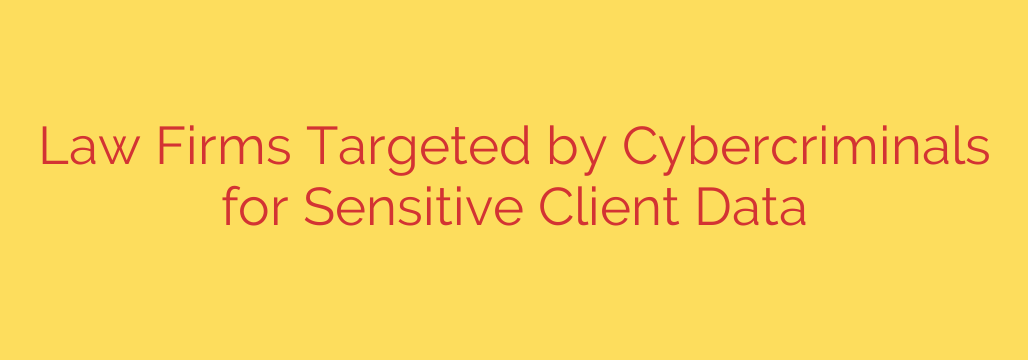
The Silent Threat: Why Law Firms Are a Prime Target for Cyberattacks
In today’s digital landscape, data is the new gold, and few organizations hold more valuable data than a law firm. From confidential case strategies and intellectual property secrets to sensitive client financial records and personal information, law firms are a treasure trove for cybercriminals. This concentration of high-stakes information has placed the entire legal sector directly in the crosshairs of sophisticated hackers.
The threat is no longer theoretical. Cyberattacks on law firms are increasing in frequency and severity, moving from a distant concern to a critical business risk. Understanding why your firm is a target and how to build a robust defense is no longer optional—it’s essential for survival and upholding your ethical duties.
A Goldmine of Data: Why Hackers Target the Legal Sector
Cybercriminals are strategic, and they follow the money. Law firms represent an almost perfect target because of the unique nature of the information they manage. A single breach can yield data that can be used for financial fraud, insider trading, corporate espionage, and extortion.
Key assets that make law firms so attractive include:
- Confidential Client Information: This includes everything from personal identifiers and financial statements to medical records and privileged communications. This data is highly valuable on the dark web.
- Mergers and Acquisitions (M&A) Details: Gaining early access to information about pending M&A deals allows criminals to engage in highly profitable insider trading.
- Intellectual Property (IP): Law firms often hold patents, trade secrets, and proprietary information for their corporate clients. Stealing this IP can cripple a company and is a primary goal for state-sponsored hacking groups.
- Litigation Strategies: Information about a legal opponent’s strategy can be sold to the other side, fundamentally compromising a case.
- Escrow and Trust Account Funds: Direct access to firm and client financial accounts is a primary motivator for many cybercriminals.
The Top Cyber Threats Facing Law Firms Today
While the motivations are clear, the methods used by attackers are constantly evolving. Firms must be aware of the most common vectors of attack to build an effective defense.
Phishing and Spear Phishing: These remain the most common entry points. Spear phishing involves highly targeted, deceptive emails that appear to be from a trusted source, like a partner, client, or court official. The goal is to trick an employee into revealing their login credentials or downloading malware.
Ransomware: This is one of the most destructive threats. In a ransomware attack, criminals encrypt a firm’s entire data system, making all files inaccessible. They then demand a substantial ransom, often in cryptocurrency, to restore access. The consequences include massive operational downtime, significant financial loss, and the risk of data being publicly leaked if the ransom isn’t paid.
Data Breaches: Criminals exploit vulnerabilities in a firm’s network, software, or security protocols to gain unauthorized access. Once inside, they can quietly exfiltrate vast amounts of data over weeks or months before being detected.
Insider Threats: Not all threats are external. A disgruntled employee or even a negligent one can cause significant damage, either by intentionally stealing data or accidentally exposing the firm to an attack through poor security practices.
The High Stakes: More Than Just Financial Loss
The consequences of a successful cyberattack extend far beyond the immediate financial cost of remediation or a ransom payment. For a law firm, the damage can be catastrophic.
- Severe Reputational Damage: Client trust is the bedrock of any legal practice. A public data breach can shatter that trust overnight, leading to a loss of clients and difficulty attracting new ones.
- Ethical and Regulatory Violations: Law firms have a profound ethical and legal duty to protect client confidentiality. A breach can lead to malpractice claims, bar association sanctions, and hefty fines under data privacy laws like GDPR or the CCPA.
- Business Disruption: The inability to access case files, billing systems, and client communications can bring a firm’s operations to a complete standstill for days or even weeks.
Building Your Defense: Actionable Security Steps for Every Firm
Protecting your firm is not a matter of if, but when you will be targeted. A proactive, multi-layered security strategy is the only viable approach.
- Prioritize Employee Security Training: Your staff is your first line of defense. Conduct regular, mandatory training on how to identify phishing emails, use strong passwords, and handle sensitive data securely.
- Implement Multi-Factor Authentication (MFA): MFA is one of the single most effective security measures you can take. It requires a second form of verification (like a code from a phone app) in addition to a password, making it significantly harder for criminals to access accounts even if they steal credentials.
- Develop and Test an Incident Response Plan: Don’t wait for a crisis to decide what to do. Have a clear, actionable plan that outlines who to contact, how to isolate affected systems, and how to communicate with clients and regulators in the event of a breach.
- Encrypt All Sensitive Data: Data should be encrypted both “at rest” (when stored on servers or hard drives) and “in transit” (when sent via email or other channels). This ensures that even if data is stolen, it remains unreadable and useless to the thief.
- Maintain Secure, Segregated Backups: Regularly back up all critical data. Crucially, these backups should be stored offline or on a separate network so they cannot be compromised during a ransomware attack.
- Control and Limit Access: Employ the “principle of least privilege.” This means that employees should only have access to the specific data and systems they absolutely need to perform their jobs.
Ultimately, cybersecurity can no longer be viewed as just an IT department issue. For modern law firms, it is a core business function and a fundamental part of upholding their professional and ethical obligations to their clients. Taking decisive action now is the best way to protect your firm, your clients, and your reputation.
Source: https://www.helpnetsecurity.com/2025/09/23/law-firms-cyberthreats/








